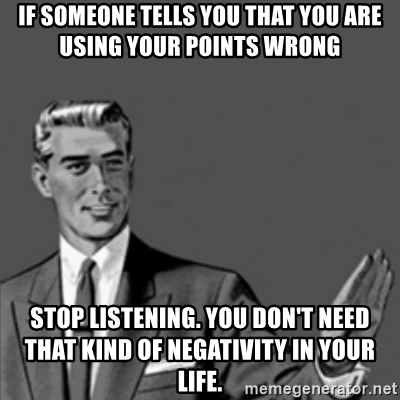Loyalty programs, including those run by travel companies, are massive data collection and number crunching operations. Before making any decision, they’ve already figured out, to their best ability, how much money it will cost and what they’ll get in return.
Those calculations include estimating the amount of “breakage” that will occur with the benefits provided. This is the number of rewards that will go unused. When companies work breakage into the calculation, they may offer a better reward (and get more participation) if they know that not all of the awards will get used. With regards to loyalty programs, breakage is letting a free night certificate or points in a program expire. I’d also include “under usage” into the breakage category – that would be redeeming a reward for less than the maximum value.
While we’ll blame companies for creating promotions encouraging a large amount of breakage, I think it’s our fault.
Some breakage is unavoidable, but much of it is self-inflicted. We’ve trained our brains to think in a certain way but those actions are the same ones that increase our chances of letting a benefit go unused.
You must maximize every redemption
Every time I write about an award booking, I’ll undoubtedly receive a message about how it was a terrible waste of points because I could have this or that or here and there on that airline with the points. Forget about if I use a 50K points certificate for a hotel that costs 36K points or redeem airline miles for domestic flights in economy class. Blasphemy!
Do you know what’s worse than using points or a certificate for less than the maximum value? Not using them at all. But we’ve convinced ourselves that anything less than the perfect usage is wasting them. This leads to a situation like this where I let an IHG free night expire while waiting to use it at the perfect time.
Retrain your brain
When it comes to anything regarding a bad habit, the experts say that you need to “rewire” your brain. I don’t know how to do that, but I do know how to reset my expectations. First, stop thinking about all possible ways to maximize your points and start looking at how loyalty programs allow you to travel more, or better than you could have otherwise. In short, use your rewards when you can for whatever you like.

For example, one of the big signup bonuses right now is 5 free Marriott nights worth up to 50,000 points each if you get a co-brand card. The certificates are good for 1 year.
Many have said this offer is for (up to) 250,000 Marriott Bonvoy points. That’s great if you can find five nights at a Marriott hotel within 1 year each costing 50K points. It’s not likely that’s going to happen, which means one of two things. You’re either going to have to use a free night for a hotel costing less than 50K points (or add up to 15K points for a more expensive hotel), or you’re going to try and maximize the free nights and possibly let them expire.
If you’ve signed up for this offer, or are thinking about it, do me a favor. Stop thinking about it as 250,000 points. Don’t put a value on it at all, for now. Instead, look for times when you can use the free nights and redeem them. Keep track of how much you would have paid for those rooms otherwise. I’m sure that you’re going to save at least $750, which is good for a signup bonus. Sure, you might save much more but you’re not captive to trying to get maximum value for every free night. Some might be worth more and others less and that’s fine.
Final Thoughts
What I’m trying to say is that we all need to stop falling into the trap of trying to maximize everything. I’m not saying that you should waste points on horrible redemptions, like buying items from the loyal program store, but you should not be afraid to redeem a free night or flight just because it’s not the best redemption you could possibly get.
After doing this for a while, I’ve learned that there’s almost always another once-in-a-lifetime offer. Programs will keep giving out awards as long as it’s profitable to them. Don’t make it even more profitable by letting your awards go to waste.
Want to comment on this post? Great! Read this first to help ensure it gets approved.
Want to sponsor a post, write something for Your Mileage May Vary or put ads on our site? Click here for more info.
Like this post? Please share it! We have plenty more just like it and would love it if you decided to hang around and sign up to get emailed notifications of when we post.
Whether you’ve read our articles before or this is the first time you’re stopping by, we’re really glad you’re here and hope you come back to visit again!
This post first appeared on Your Mileage May Vary
H/T: Miles to Go Podcast
